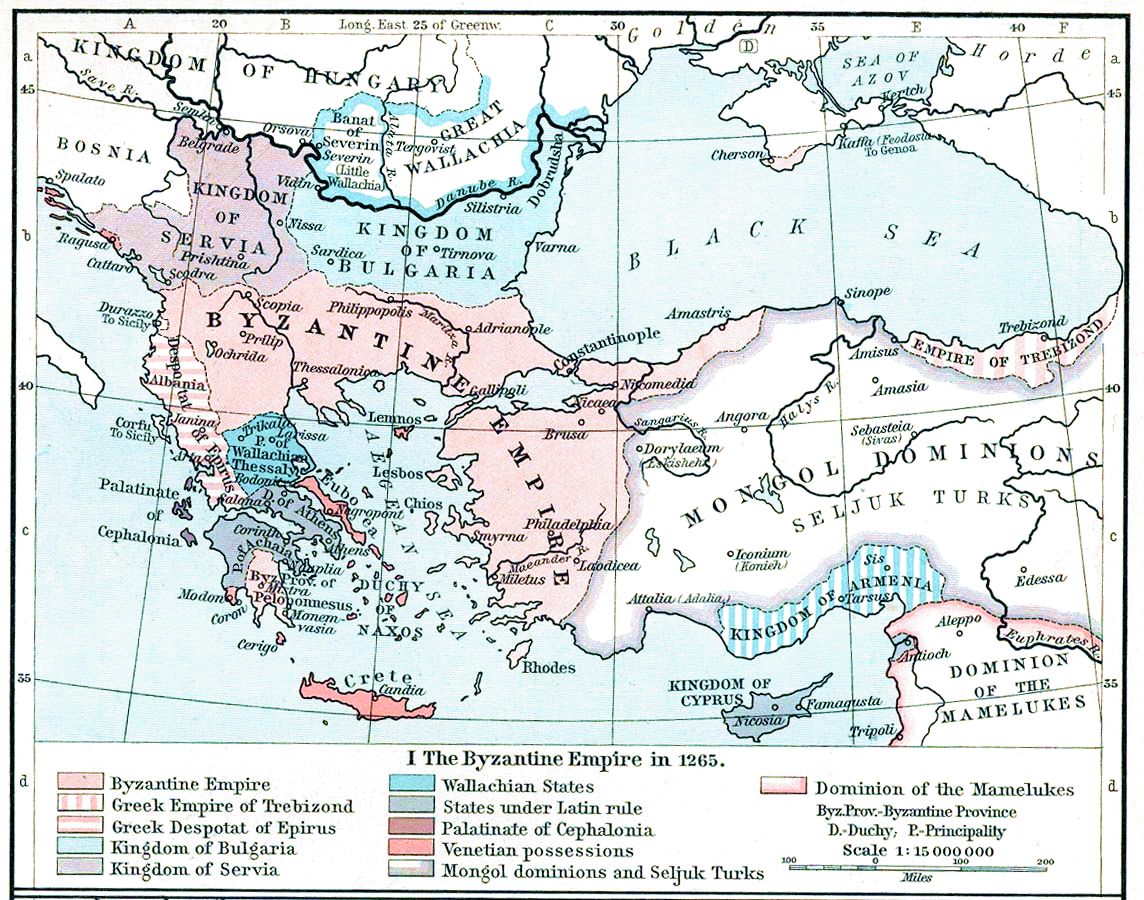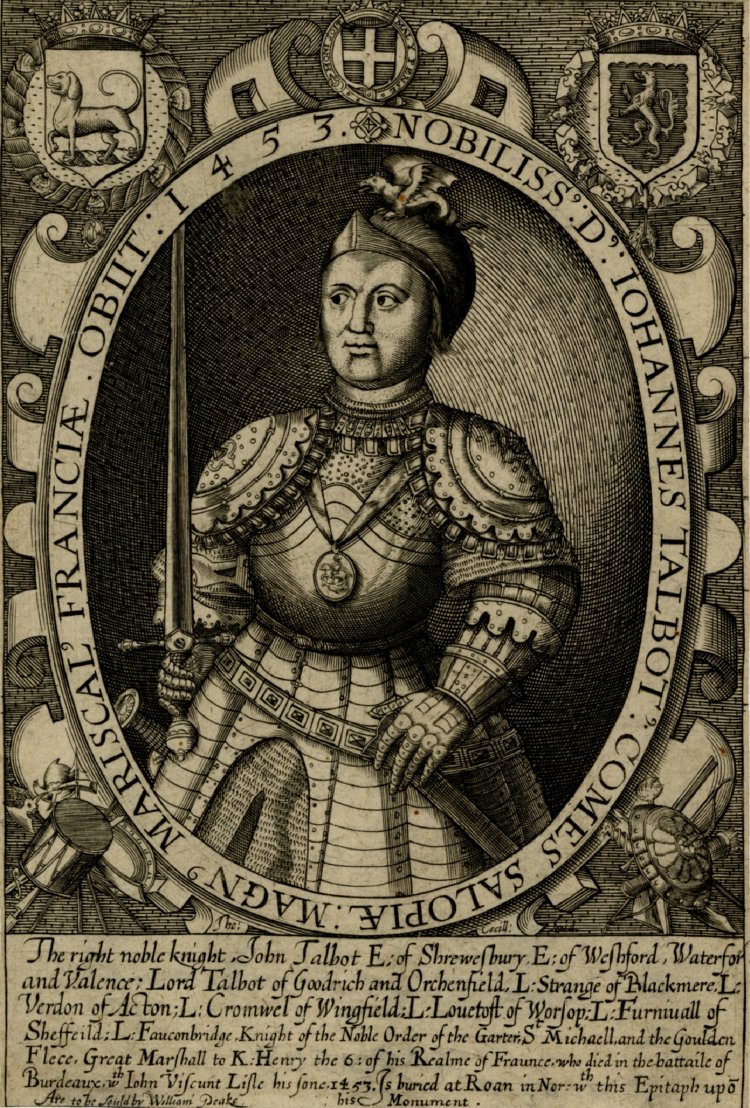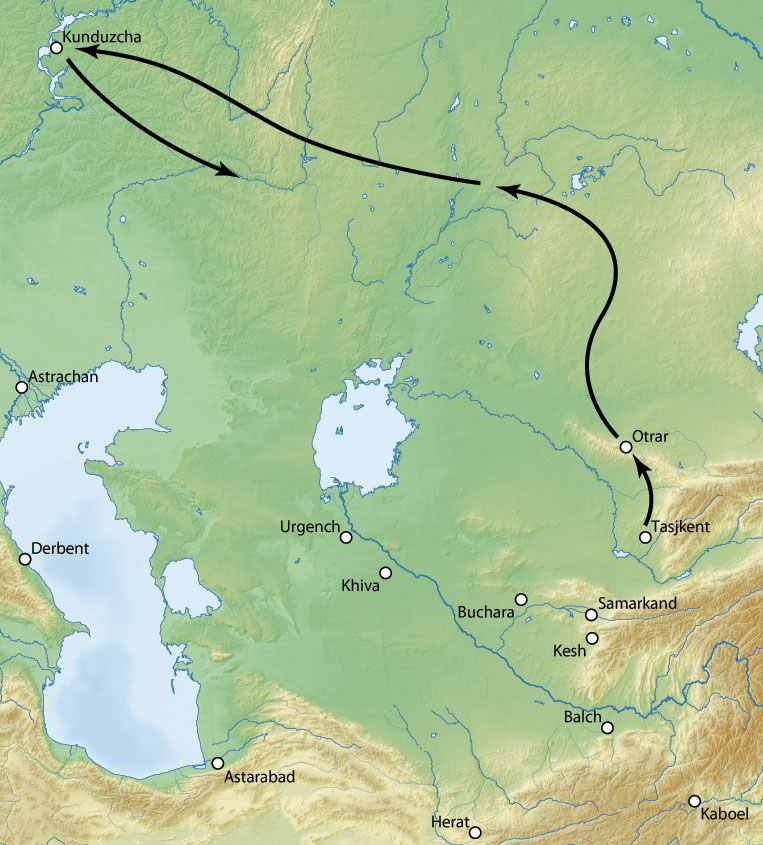|
June 18
Events Pre-1600 * 618 – Li Yuan becomes Emperor Gaozu of Tang, initiating three centuries of Tang dynasty rule over China. * 656 – Ali becomes Caliph of the Rashidun Caliphate. * 860 – Siege of Constantinople (860), Byzantine–Rus' War: A fleet of about 200 Rus' Khaganate, Rus' vessels sails into the Bosphorus and starts pillaging the suburbs of the Byzantine Empire, Byzantine capital Constantinople. *1053 – Battle of Civitate: Three thousand Normans, Norman horsemen of Humphrey of Hauteville, Count Humphrey rout the troops of Pope Leo IX. *1264 – The Parliament of Ireland meets at Castledermot in County Kildare, the first definitively known meeting of this Irish legislature. *1265 – A draft Byzantine–Venetian treaty of 1265, Byzantine–Venetian treaty is concluded between Venetian envoys and Emperor Michael VIII Palaiologos, but is not ratified by Doge Reniero Zeno. *1391 – Tokhtamysh–Timur war: Battle of the Kondurcha River: Timur ... [...More Info...] [...Related Items...] OR: [Wikipedia] [Google] [Baidu] |
Emperor Gaozu Of Tang
Emperor Gaozu of Tang (7 April 566 – 25 June 635), born Li Yuan, courtesy name Shude, was the founding Emperor of China, emperor of the Tang dynasty of China, reigning from 618 to 626 CE. Under the Sui dynasty, Li Yuan was the governor in the area of modern-day Shanxi, and was based in Taiyuan. In 615, Li Yuan was assigned to garrison Longxi. He gained much experience by dealing with the Göktürks of the north and was able to pacify them. Li Yuan was also able to gather support from these successes and, with the disintegration of the Sui dynasty in July 617, Li Yuan – urged on by his second son Emperor Taizong of Tang, Li Shimin (, the eventual Emperor Taizong) – rose in rebellion. Using the title of "Great Chancellor" (), Li Yuan installed a puppet child emperor, Yang You, but eventually removed him altogether and established the Tang dynasty in 618 with himself as emperor. His son and successor Li Shimin honoured him as Gaozu ("high founder") after his death. Emperor ... [...More Info...] [...Related Items...] OR: [Wikipedia] [Google] [Baidu] |
1265
Year 1265 ( MCCLXV) was a common year starting on Thursday of the Julian calendar. Events By place Europe * January 20 – In Westminster, the first elected English parliament (called Montfort's Parliament) conducts its first meeting in the Palace of Westminster, later to be known as the Houses of Parliament. * March – End of the Hungarian Civil War (1264–1265) – Battle of Isaszeg: Younger King Stephen decisively defeats his father's army. * May 28 – Future King Edward I of England escapes the captivity of Simon de Montfort, 6th Earl of Leicester. * June 18 – A draft Byzantine–Venetian treaty is concluded between Venetian envoys and Emperor Michael VIII Palaiologos, but is not ratified by Doge Reniero Zeno * August 4 – Second Barons' War in England: The Battle of Evesham is fought in Worcestershire, with the army of Edward defeating the forces of rebellious barons led by Simon de Montfort, resulting in the death of Montfort and many of his allies. ... [...More Info...] [...Related Items...] OR: [Wikipedia] [Google] [Baidu] |
John Talbot, 1st Earl Of Shrewsbury
John Talbot, 1st Earl of Shrewsbury, 1st Earl of Waterford, 7th Baron Talbot, KG (17 July 1453), known as "Old Talbot" and "Terror of the French" was an English nobleman and a noted military commander during the Hundred Years' War. He was the most renowned in England and most feared in France of the English captains in the last stages of the conflict. Known as a tough, cruel, and quarrelsome man, Talbot distinguished himself militarily in a time of decline for the English. Called "the English Achilles", he is lavishly praised in the plays of Shakespeare. The manner of his death, leading an ill-advised charge against field artillery, has come to symbolize the passing of the age of chivalry. He also held the subsidiary titles of 10th Baron Strange of Blackmere and 6th Baron Furnivall. Origins He was descended from Richard Talbot, the son of William "Le Sire" Talbot, whose estate (wife and infant son Hugh) was a tenant in 1086 of Walter Giffard at Woburn and Battlesden in Be ... [...More Info...] [...Related Items...] OR: [Wikipedia] [Google] [Baidu] |
Charles VII Of France
Charles VII (22 February 1403 – 22 July 1461), called the Victorious () or the Well-Served (), was King of France from 1422 to his death in 1461. His reign saw the end of the Hundred Years' War and a ''de facto'' end of the English claims to the French throne. During the Hundred Years' War, Charles VII inherited the throne of France under desperate circumstances. Forces of the Kingdom of England and the duke of Burgundy occupied Guyenne and northern France, including Paris, the capital and most populous city, and Reims, the city in which French kings were traditionally crowned. In addition, his father, Charles VI, had disinherited him in 1420 and recognized Henry V of England and his heirs as the legitimate successors to the French crown. At the same time, a civil war raged in France between the Armagnacs (supporters of the House of Valois) and the Burgundian party (supporters of the House of Valois-Burgundy, which was allied to the English). With his court removed ... [...More Info...] [...Related Items...] OR: [Wikipedia] [Google] [Baidu] |
1429
Year 1429 ( MCDXXIX) was a common year starting on Saturday of the Julian calendar. Events January–March * January 6 – The Congress of Lutsk opened in the Grand Duchy of Lithuania at the castle of Liubartas in Lutsk. In addition to the Lithuanian nobles gathered there with the Supreme Duke of Lithuania Władysław II Jagiełło and the Grand Duke Vytautas, the Congress was attended by Sigismund, King of Germany, Bohemia, Hungary and Croatia; Erik VII, King of Denmark; a Komtur of the Teutonic Knights; Vasily II, Grand Prince of Moscow; Boris, Duke of Tver; Ivan III, Duke of Ryazan; the Voivode Dan II of Wallachia; and representatives of the Pope, the Byzantine Empire and Moldavia. , to discuss the coronation of Vytautas as the King of Lithuania, as well as the siege of Moldavia, entering a against the Ottoman Empire, the ongoing war between Denmark and the Hanseatic League, religious unions and divisions, and assorted economic, trade, and tax-relate ... [...More Info...] [...Related Items...] OR: [Wikipedia] [Google] [Baidu] |
Golden Horde
The Golden Horde, self-designated as ''Ulug Ulus'' ( in Turkic) was originally a Mongols, Mongol and later Turkicized khanate established in the 13th century and originating as the northwestern sector of the Mongol Empire. With the division of the Mongol Empire after 1259, it became a functionally separate khanate. It is also known as the Kipchak Khanate or the Ulus of Jochi, and replaced the earlier, less organized Cuman–Kipchak confederation. After the death of Batu Khan (the founder of the Blue Horde) in 1255, his dynasty flourished for a full century, until 1359, though the intrigues of Nogai Khan, Nogai instigated a partial civil war in the late 1290s. The Horde's military power peaked during the reign of Özbeg Khan (1312–1341), who adopted Islam. The territory of the Golden Horde at its peak extended from Siberia and Central Asia to parts of Eastern Europe from the Ural Mountains, Urals to the Danube in the west, and from the Black Sea to the Caspian Sea in the south ... [...More Info...] [...Related Items...] OR: [Wikipedia] [Google] [Baidu] |
Tokhtamysh
Tokhtamysh ( Turki/ Kypchak and Persian: توقتمش; ; ; – 1406) was Khan of the Golden Horde from 1380 to 1395. He briefly succeeded in consolidating the Blue and White Hordes into a single polity. Tokhtamysh belonged to the House of Borjigin, tracing his ancestry to Genghis Khan. Spending most of his younger years fighting against his father's cousin Urus Khan and his sons, Tokhtamysh sought help from the Turco-Mongol warlord Timur, with whose help he succeeded in defeating his enemies. Tokhtamysh rose to power during a tumultuous period in the Golden Horde, which was severely weakened after a long period of division and internecine conflict. From a fugitive, Tokhtamysh had become a powerful monarch, quickly solidifying his authority in both wings of the Golden Horde. Encouraged by his success, as well as the growth of his manpower and wealth, Tokhtamysh went on a military expedition to the Russian principalities, sacking Moscow in 1382. He reasserted the Tatar–Mo ... [...More Info...] [...Related Items...] OR: [Wikipedia] [Google] [Baidu] |
Timur
Timur, also known as Tamerlane (1320s17/18 February 1405), was a Turco-Mongol conqueror who founded the Timurid Empire in and around modern-day Afghanistan, Iran, and Central Asia, becoming the first ruler of the Timurid dynasty. An undefeated commander, he is widely regarded as one of the greatest military leaders and tacticians in history, as well as one of the most brutal and deadly. Timur is also considered a great patron of art and architecture, for he interacted with intellectuals such as Ibn Khaldun, Hafez, and Hafiz-i Abru and his reign introduced the Timurid Renaissance. Born into the Turkicized Mongol confederation of the Barlas in Transoxiana (in modern-day Uzbekistan) in the 1320s, Timur gained control of the western Chagatai Khanate by 1370. From that base he led military campaigns across Western, South, and Central Asia, the Caucasus, and Southern Russia, defeating in the process the Khans of the Golden Horde, the Mamluks of Egypt and Syria, the emerg ... [...More Info...] [...Related Items...] OR: [Wikipedia] [Google] [Baidu] |
Battle Of The Kondurcha River
The Battle of the Kondurcha River (18 June 1391) was the first major battle of the Tokhtamysh–Timur war. It took place at the Kondurcha River, in the Bulgar Ulus of the Golden Horde, in present-day Samara Oblast, Russia. Tokhtamysh's cavalry tried to encircle Timur's army from the flanks. However, the Central Asian army withstood the assault, after which its sudden frontal attack put the Horde troops to flight. However, many of the Golden Horde troops escaped to fight again at Terek. Timur had previously assisted Tokhtamysh in taking the throne of the White Horde in 1378. In the following years both men grew in power, with Tokhtamysh taking full control of the Golden Horde while Timur expanded his power all over the Middle East. However Timur took Azerbaijan, which Tokhtamysh believed was rightfully Golden Horde territory. He invaded Timurid territory, briefly besieging Samarkand Samarkand ( ; Uzbek language, Uzbek and Tajik language, Tajik: Самарқанд / Samarq ... [...More Info...] [...Related Items...] OR: [Wikipedia] [Google] [Baidu] |
Tokhtamysh–Timur War
The Tokhtamysh–Timur war was fought from 1386 to 1395 between Tokhtamysh, the khan of the Golden Horde, and the warlord and conqueror Timur, founder of the Timurid Empire, in the areas of the Caucasus Mountains, Turkestan and Eastern Europe. The battle between Timur and Tokhtamysh played a key role in the decline of Mongol power over the Russian principalities. Background In the late 1370s and early 1380s, Timur helped Tokhtamysh assume supreme power in the White Horde against Tokhtamysh's uncle Urus Khan. After this Tokhtamysh united the White and Blue Hordes, reuniting the Golden Horde, and launched a massive military punitive campaign against the Russian principalities between 1381 and 1382, restoring Turco-Mongol ( Tatar) power in Russia after the defeat in the Battle of Kulikovo. The Golden Horde, after a period of anarchy between the early 1360s and late 1370s, briefly reestablished itself as a dominant regional power, defeating Lithuania around 1383. But Tokhtamysh h ... [...More Info...] [...Related Items...] OR: [Wikipedia] [Google] [Baidu] |
1391
Year 1391 ( MCCCXCI) was a common year starting on Sunday of the Julian calendar. Events January–December * June 6 – Massacre of 1391: Anti-Jewish pogroms erupt in Seville, Spain. Many thousands of Jews are massacred, and the violence spreads throughout Spain and Portugal, especially to Toledo, Barcelona and Mallorca. This event marks a turning-point in the history of the Spanish Jews, with most of the survivors leaving the Iberian Peninsula or being forced to convert. * July 18 – Tokhtamysh–Timur war – Battle of the Kondurcha River: Timur defeats Tokhtamysh of the Golden Horde, in present day southeast Russia. Date unknown * Manuel II Palaiologos becomes Byzantine emperor after his father, John V Palaiologos, dies of a nervous breakdown, due to his continued humiliation by the Ottoman Empire. * Yusuf II succeeds Muhammed V, as Nasrid Sultan of Granada (now southern Spain). * Stephen Dabiša succeeds Stephen Tvrtko I, as King of Bosnia. ... [...More Info...] [...Related Items...] OR: [Wikipedia] [Google] [Baidu] |




